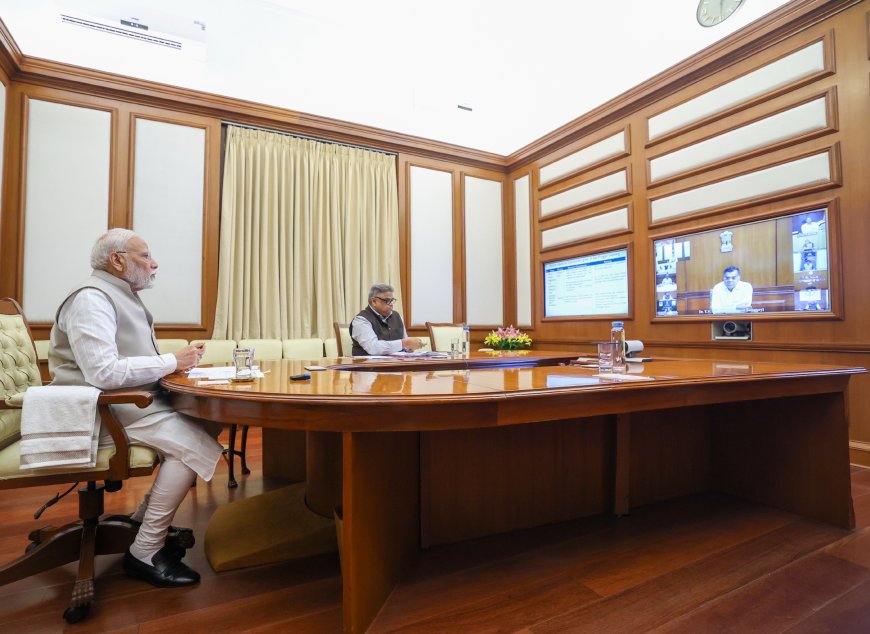PM Modi Chairs 48th PRAGATI Meeting, Reflects on Emergency Era and Accelerates Infrastructure Push
PM Modi chairs the 48th PRAGATI meeting, pushing for faster infrastructure delivery, and commemorates 50 years of the Emergency during a Cabinet address on democracy.

New Delhi, June 26, 2025 — Prime Minister Narendra Modi on Wednesday chaired the 48th edition of the PRAGATI (Pro-Active Governance and Timely Implementation) meeting, where he reviewed critical infrastructure projects and emphasized expeditious delivery of government schemes. The meeting, held via video conferencing with Chief Secretaries and top officials across states, was followed by a Union Cabinet meeting in which the Prime Minister marked the 50th anniversary of the 1975 Emergency, offering pointed reflections on the state of democracy then and now.
Fast-Tracking Infrastructure: Key Projects Reviewed
At the heart of the PRAGATI meeting were eight major infrastructure projects across road transport, railways, and energy sectors, collectively worth over ₹56,000 crore. The reviewed projects span multiple states, including Uttar Pradesh, Maharashtra, Odisha, Assam, and Tamil Nadu, with an eye on bolstering economic connectivity and regional development.
Among the highlights:
-
Bharatmala and Gati Shakti corridors in Uttar Pradesh and Maharashtra.
-
A critical freight rail corridor connecting key eastern and western industrial zones.
-
A large-scale solar energy grid project in Rajasthan and Gujarat aimed at strengthening India's renewable energy capacity.
PM Modi underscored the need for “real-time coordination between ministries and state governments,” reiterating his call for minimum delay, maximum delivery.
For an official list of projects and performance dashboards, refer to the PRAGATI Portal hosted by NIC.
PM Modi’s Remarks: Democracy and the Emergency
Later, during the Cabinet meeting, Prime Minister Modi made a solemn reference to June 25, 1975, the day Emergency was declared by then-Prime Minister Indira Gandhi, calling it a “dark chapter in Indian democracy.”
“Today marks 50 years since a constitutional democracy was turned into a personal dictatorship. We must remember those who stood for liberty, even when it meant imprisonment,” Modi stated. “India's democracy has matured, but we must never take our freedoms for granted.”
His remarks come at a time when political narratives around the Emergency have re-entered public discourse, with the BJP leveraging the moment to contrast past authoritarianism with current democratic mechanisms.
For context on India’s Emergency period, read this comprehensive retrospective by India Today.
Governance Performance Under PRAGATI
Launched in 2015, PRAGATI is a unique multi-modal platform involving the Prime Minister, Union Secretaries, and Chief Secretaries of states. It has since become a cornerstone of Modi’s governance philosophy — combining tech-enabled transparency with bureaucratic accountability.
According to the Cabinet Secretariat, over 328 projects worth more than ₹17 lakh crore have been reviewed under PRAGATI to date.
“PRAGATI has fundamentally altered inter-governmental coordination,” said Arvind Saxena, a retired bureaucrat and former member of the Planning Commission. “It is governance in real-time, not just in files.”
An evaluation of the PRAGATI framework and past projects is available on MyGov India’s policy tracker.
Opposition Reactions and Broader Political Context
Opposition parties responded to Modi’s Emergency remarks with caution. Congress leader Jairam Ramesh tweeted that the Prime Minister should “focus more on today’s threats to democracy — including the misuse of agencies and stifling of press freedom — than weaponizing the past.”
TMC MP Mahua Moitra also criticized what she termed a “selective memory” of democratic backsliding, citing arbitrary arrests under UAPA and curbs on digital media.
While these comments did not feature in the Cabinet meeting, they underscore the ongoing ideological divide in Indian politics. The BJP, meanwhile, has planned a week of events across states to “educate youth on the Emergency and democratic resilience.”
For ongoing updates, The Wire and LiveLaw are closely following statements from all sides.
Focus on States: Directives to Speed Up Delivery
In keeping with the cooperative federalism model, Modi instructed Chief Secretaries of lagging states to “remove local bottlenecks” and fast-track approvals, especially in critical sectors like rural electrification, water access, and smart city planning.
He emphasized the Aspirational Districts Programme, urging better data monitoring and performance mapping. Officials were also asked to ensure citizen grievance redressal timelines were being met consistently.
For data on district performance under the Aspirational Districts initiative, see NITI Aayog’s official tracker.
Looking Ahead: What the 48th PRAGATI Signals
The 48th PRAGATI meeting reinforced the Modi government’s push toward infrastructure-led economic recovery, especially as the nation prepares for the 2026 Union Budget. With elections in key states like Bihar, Punjab, and Gujarat next year, speed and scale of project execution could shape public opinion significantly.
Political observers believe that combining governance performance with ideological narratives, such as invoking the Emergency, is part of the BJP’s broader electoral strategy heading into 2026.
“It’s a twin-pronged message: efficient governance and ideological clarity,” noted Dr. Shruti Deshpande, a senior fellow at the Centre for Policy Research.














